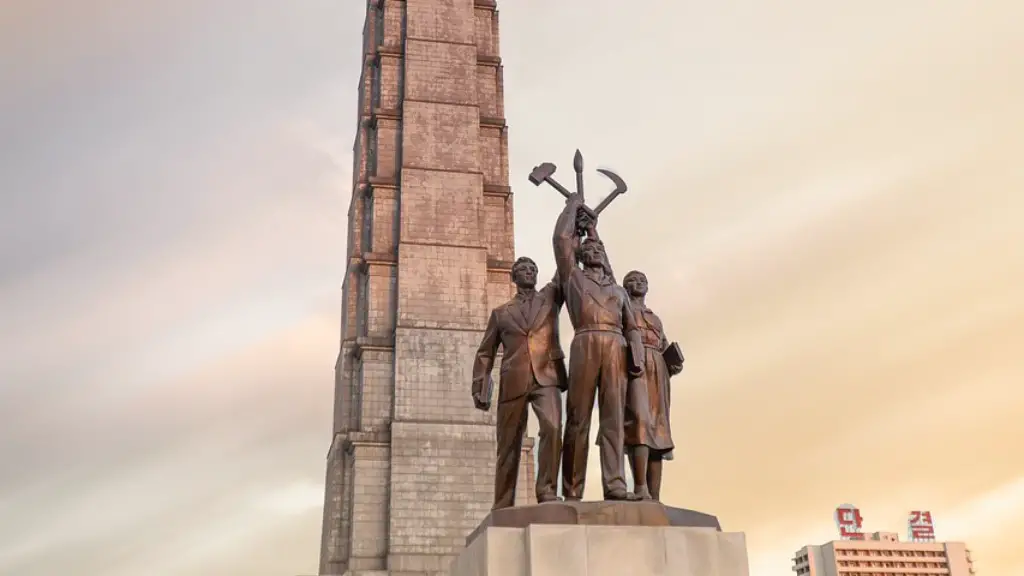Historical Background
North and South Korea were a single nation until the Korean War in 1950. At the end of the war, Korea was split into two separate countries as a result of economic, political, and military pressure from both the Soviet Union and the United States. North Korea was backed by the Soviet Union, while South Korea had the support of the United States. By 1953, South and North Korea had become two distinct and separate countries.
Since then, the two countries have had a volatile relationship, characterized by frequent military threats, and a history of failed negotiations. South Korea is a democratic nation with a market economy, while North Korea is an authoritarian regime with a planned economy that features extreme poverty. The two countries also share a long, contentious border that is heavily guarded on both sides.
Reasons For Separation
The primary reason for the separation of North and South Korea is due to the ideological differences between the two countries and the presence of political and economic power struggles.
In 1945, after World War II, both North and South Korea were occupied by foreign armies from the Soviet Union and the United States. During this time, the two countries developed different political systems, and eventually, two different governments were formed. The Soviet-backed North adopted a communist system, while the US-backed South adopted a democratic system.
The ideological differences led to the formation of two distinct and opposing governments in North and South Korea. South Korea developed a strong economy while North Korea stagnated. This caused a power struggle between the two countries, which led to violence and a series of failed negotiations that ultimately resulted in their separation.
Economic Factors
Since the end of World War II, the economic factors between North and South Korea have been a major cause of friction.
North Korea had relied heavily on aid from the Soviet Union following the war, while South Korea had relied on support from the United States. When the Soviet Union collapsed in 1991, North Korea was forced to become more economically independent but suffered from a lack of resources and a decline in foreign aid. In contrast, South Korea was able to continue to benefit from its strong economic ties with the United States and become increasingly prosperous.
North Korea’s weakened economy has caused a rift between the two countries, leading to heightened tensions and military threats, as well as a decreasing number of negotiations and failed peace talks that have contributed to the North and South continuing to function as two separate nations.
Attitude of North Korean Regime
The attitude of the North Korean regime has also been a major contributor to the continuing separation between North and South Korea.
The North Korean government is known for its belligerent attitude towards the South and the international community. North Korea often uses threatening language and has a history of issuing military threats, as well as refusing to participate in negotiations or peace talks. This attitude has perpetuated the distrust between the two countries, and has prevented any significant progress in reunifying them.
Lack of Willingness to Reunify
The lack of willingness to reunify has also been a major stumbling block in North and South Korea’s talks to bring about a peaceful reunification. Although there has been public support for reunification in both countries, the governments have been unwilling to take the necessary steps to achieve it.
The South Korean government has been hesitant to open talks with the North due to security concerns and the potential economic burden of reunification, while the North Korean government has insisted that the South must accept its dictatorial system before any talks of reunification can commence.
The lack of will to negotiate and the persisting differences in ideology have kept the two nations separated up to this day.
2nd Historical Background
The division of Korea dates back to the end of the Second World War when Japan ended its 35-year rule over the peninsula. At the Potsdam Conference of 1945, it was agreed that the Soviet Union would occupy the north and the United States the south of Korea. This division was intended to be temporary, but as the two powers moved further apart politically, it became a permanent division.
In 1948, the south elected a government and North Korea declared itself the Democratic People’s Republic of Korea in 1949, while the south declared itself the Republic of Korea in the same year. These two governments proceeded to initiate hostilities against each other.
The division of the peninsula was based upon ideological and political differences between the two governments. North Korea followed an extremist, totalitarian ideology, while South Korea embraced a US-backed capitalist regime.
2nd Reasons For Separation
The ideology and politics of each Korean government were the major factors in their separation. Political tensions between South and North Korea have never been resolved, as both sides have been unable to reach a compromise on a number of issues, including the reunification of families and the reopening of economic exchanges between the two countries.
Since the end of the Korean War, the two countries have been in an ongoing state of hostility, characterized by military tensions and threats, a history of failed negotiations, and a heavily guarded border between them. North Korea’s closed economy and its reliance on the Soviet Union for aid meant that South Korea’s economy grew and prospered, while North Korea remained in poverty and isolation.
These economic divides between the two countries have been a contributing factor to their continued separation, as North Korea has occasionally threatened South Korea in an attempt to gain economic advantages, such as aid and resources.
Furthermore, the traditional policy of North Korea’s regime of isolation and belligerence has necessitated the South’s continued guard of the borders and the government’s refusal to open up peaceful negotiations.
2nd Economic Factors
The economic differences between North and South Korea have been a major cause of their continued separation. North Korea relies heavily on aid from the Soviet Union and other countries, while South Korea has maintained powerful economic ties to the US, fueling its growth.
The economic disparity between the two countries has been a major obstacle to negotiations and peace talks, as it is difficult to find a middle ground on trade, aid, and other economic topics. Additionally, North Korea’s weak economy means that its threats of military action are more credible, and South Korea has been unwilling to risk its own economic prosperity by further engaging with North Korea.
2nd Attitude of North Korean Regime
The attitude of the North Korean regime has been a major contributor to the perpetuation of the separation between North and South Korea. The North Korean government is known for its attempts to use military threats, disinformation campaigns, and propaganda to maintain its power and control over its citizens.
It has also been unwilling to engage in friendly conversations or negotiations with South Korea, instead using belligerent language and military action to dissuade South Korea from attempting to engage in peaceful dialogue.
This attitude has helped to perpetuate the cold war era ideology between the two countries and has hindered any progress in reunification, increasing the gap between the two governments even further.
2nd Lack of Willingness to Reunify
Furthermore, the lack of will to reunify has been another major obstacle in the relationship between North and South Korea. Both countries have expressed interest in reunification, but the governments have been unwilling to take the necessary steps to achieve it.
South Korea has been hesitant to open talks with the North due to security concerns and the potential economic burden of reunification, while North Korea has insisted that South Korea must accept its dictatorial system before any talks of reunification can occur.
Additionally, South Korea has been unwilling to provide aid to North Korea and has instead emphasized economic sanctions, further worsening the economic divide, and preventing any significant progress from being made in unification talks. The lack of willingness to negotiate, combined with the persisting economic and ideological differences, has led to the current separation between the two countries.


